The Immense Waste – UCLouvain and Women
Autumn 1928. The great feminist author Virginia Woolf is working on two lectures at the University of Cambridge. Theme: women and fiction. This will give rise to the seminal essay “A Room of One’s Own”. To prepare for her lectures, she walks and thinks on the grounds of the English university. A supervisor shows up and makes her leave the grounds that are reserved for male academics only. “In the name of protecting the grounds whose upkeep they passed on to each other for three hundred years, they had scared my little fish away” she writes. This was the nickname she gave to her thought process, which started out as insignificant, but led to research and then result – literary, academic, and scientific.
Caroline Nieberding and Bertanne Visser are Virginia Woolfs. Why do female researchers flee science faculties, academia, and UCLouvain in particular? The two biologists denounce sexism. They demanded “their own laboratories” to work properly and publish results. They cite the names of supervisors (professors, executives) who have been protecting the grounds passed on by their predecessors for 600 years (1).
The Virginia Woolfs of UCLouvain have been coming and going for decades. The earliest testimony we have is that of Hélène Verougstraete. This Professor Emeritus in art history, employed by UCLouvain from 1973 to 2009, believes she was harassed by a number of colleagues, without ever receiving the support of the rectorate, despite her warnings. Discrimination begins at the very start of an academic career, she points out. “When I asked to bring my course load down to the same level as my colleagues, I was told to give up the course in my specialization rather than other courses. Afterwards, I sensed that rumors were circulating in the corridors, but if I didn’t know what they were, I couldn’t defend myself.” Women leave permanently “traumatized and destabilized” by this sexist spiral that is part of the university machine (2).
“I sensed that rumors were circulating in the corridors, but if I didn’t know what they were, I couldn’t defend myself.”
– Professor Hélène Verougstraete, more than 20 years before Caroline Nieberding.
Another professor, who wishes to remain anonymous, describes the same process she underwent in the law faculty between 2000 and 2010. Why? “I did not fit into their mold”, she sums up. They are far from alone in this respect. Several times, Hélène Verougstraete wanted to leave the academic world. Only the comfort of living close to her workplace and good relations with her direct colleagues made her stay. When she discovered Caroline Nieberding’s file in 2022, she was struck by the similarity of their backgrounds: what she calls the “profound misogyny” at UCLouvain. “Caroline Nieberding was going through the same thing I was back then”.
INDIVIDUALISM AND PASSIVITY
In 2021, a witness (university researcher) interviewed by Médor observes an “unhealthy atmosphere” at the Earth and Life Institute (ELI), one of UCLouvain’s largest research institutes (429 members and affiliates), and particularly the ELI-B (for Biodiversity) research cluster. At the time, Caroline Nieberding was a professor in terrestrial ecology, and Bertanne Visser carried out her research under contract with the Fonds de la Recherche Scientifique (FNRS). They are known as the “two witches”. Caroline Nieberding would “kidnap children in a van”. These stories, even as a joke, were related by doctoral students, as well as by administrative and technical staff. As a result, the views of the two biologists’ teams is very negative.
Caroline Nieberding arrives at UCLouvain in 2008. Owing to her research career at the Universities of Liège and Leiden, she was awarded a professorship at the tender age of 28 years old. In 2016, Bertanne Visser, Dutch and trained in Leiden and Amsterdam, joined Caroline Nieberding’s team for her postdoctoral studies. She soon discovered that male researchers in the ELI-B cluster denigrate Caroline Nieberding in meetings, make her research funding and publications their own and have shorter working hours. Bertanne Visser, who began experiencing the same things, helps her colleague to open her eyes.
The internal commission of inquiry confirms the physical violence of N.S. One day, this biology professor pulled a female technician by her collar in the middle of the corridor.
To denounce what she’s going through, Caroline Nieberding starts with the basics: write to the vice rector of staff policy (VRPP), Didier Lambert, who has been a member of the rectoral council since 2010. In a letter dated February 28, 2020, she describes the “general climate of non-recognition, even denigration” of her work. She cites four male colleagues at her institute. One biologist, a full professor, is cited for verbal aggression, surprise shouting matches and derogatory emails. Another full professor, also a biologist, for a hand on the buttocks. An extraordinary emeritus professor, engineer, for taking photos of her in a meeting without her consent. Finally, N. S., a professor like herself, for recurring remarks about her looks, disparaging emails, and barging into her office. Shouldn’t UCLouvain, their employer, as well as hers, react, wouldn’t you think?
A consultant from FABI (Training, Support, and Well-being) is responsible for identifying problems among members of the ELI-B cluster. She lists: Opportunism, individualism, ordinary sexism. An internal commission of inquiry commissioned to investigate the issue delivers its findings in March 2021. It acknowledged Caroline Nieberding’s “suffering” and the passive attitude and denial of the authorities and colleagues, but believes that the facts of sexism and harassment are not proven, while acknowledging that it is difficult to prove such facts. However, the commission of inquiry’s report confirms several of the behaviors denounced by Caroline Nieberding, including physical violence by professor N.S. towards a female technician who was pulled by the collar in the middle of the corridor (3). This incident was corroborated by a witness. The commission writes that this professor has “a strong personality who often expresses himself vehemently to assert his ideas and disagreements, bordering on the aggressive”. In the investigation report, another male colleague reported by Caroline Nieberding is described by a former doctoral student as belonging “to the ‘very old school’ […], who imagined, like the others, that Caroline, being so young […], would somehow stay in her place”.
None of these men are facing any disciplinary proceedings to establish the facts in depth. Neither then nor later. On the other hand, the academic authorities, and in this case the vice rector for science and technology Michel Devillers, chose to move the protagonists: the men cited by the commission of inquiry were assigned to a new cluster (ELI-X), while Caroline Nieberding and Bertanne Visser are placed “under the supervision” (4) of the President of the ELI Institute. But they have recently secured funding (5) and their teams are expanding… As a result, they prefer to have laboratory spaces of their own and greater autonomy in the management of budget and space (Virginia Woolf suggested nothing else in 1928).
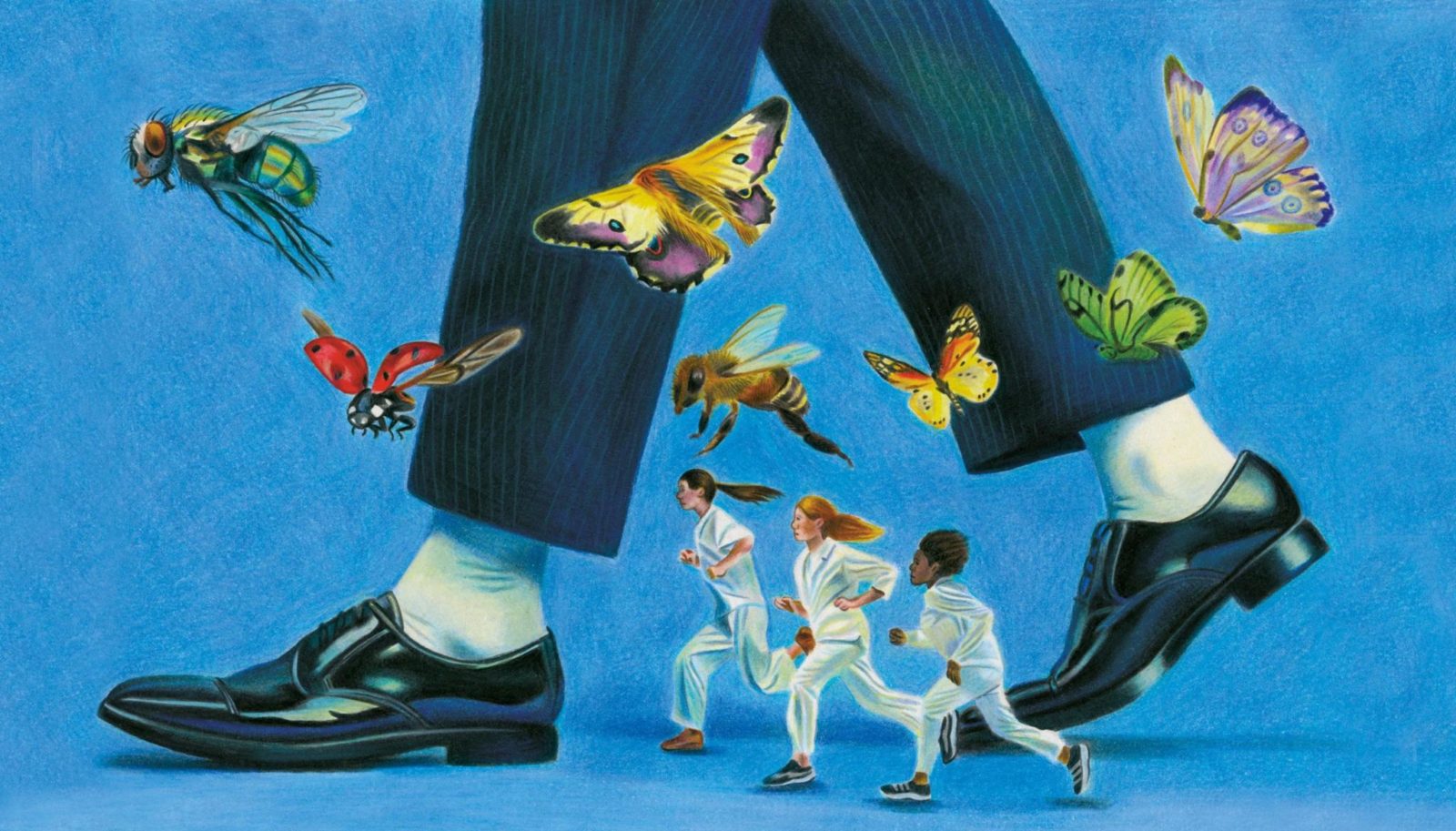
Credit @ Laura Ottone
The idea did not go down well with the men at the Institute. In June 2021, when the Institute meets (6), “they came with their presentation, but nobody handed them a microphone. We couldn’t hear them. I asked for one to be given to them, but male colleagues were cutting them off.”, says climatologist Jean-Pascal van Ypersele, leader of the IPCC, professor at the ELI Institute (7), and the main male figure to publicly support the two biologists. ‘Months later, we received the meeting’s minutes. Their presentation was missing. I suggested amendments, which were accepted through a very unusual voting procedure. But once again, the amendments were not included in the rectified minutes. This may seem anecdotal. In fact, it illustrates how a power struggle works. Two feminists ask for a safe workplace? The answer is no. Worse still, the Institute’s board appointed N. S. as president of the meetings. He also became director of the new ELI-X (renamed ELI-V) and the School of Biology. The teams of Caroline Nieberding and Bertanne Visser find themselves under the authority of a man whose behavior is recognized as problematic.
EXPEDITED DISMISSAL
The first time we interview Caroline Nieberding and Bertanne Visser, we almost forget to ask them about their scientific research. Caroline Nieberding and her team study butterflies that change color with the seasons and are good models for understanding how climate change is leading to species’ extinction. Bertanne Visser focuses on particularly charming wasps – “nature’s mass murderers” she laughs – that never put on weight, no matter how much sugar they ingest. “On a daily basis, we read, think a lot, and write, which is super important, because publications are the currency of science” continues Bertanne Visser. “A large part of our work also involves obtaining funding to build our labs. It’s all about finding new ways of studying insect adaptation. Caroline is very good at this. She really has the ability to push the boundaries of our research field.”
“As soon as I walked into his office, Vincent Blondel told me straight out: “You are damaging the reputation of UCLouvain.”
– Jean-Pascal van Ypersele, climatologist
When they ask in 2021 for formal intervention from the occupational health services (managed at UCLouvain by the CESI), they are, above all, trying to work properly in an unsafe working environment. For Bertanne Visser, this requires the use of a mass spectrometer obtained for her team in 2020. The costs of this “nugget”: €87,000 (€65,000 purchase + running costs, public money). The researcher suggests that the machine should be placed temporarily in Gembloux (ULiège), as the staff there are already well trained to use it. UCLouvain opposes this, but Bertanne Visser confirms the placement at Gembloux. Things then move quickly: the University dismissed her for “serious misconduct”. This is despite the CESI’s ongoing internal procedure, which is supposed to protect the employees from reprisals. “Despite the regulations, I was not heard by rector Vincent Blondel. Neither before nor during the dismissal procedure” denounces Bertanne Visser. In the meantime, UCLouvain attributed the machine to another professor, claiming (falsely)(8) in an email to ULiège that this professor was co-promoter on the project of Bertanne Visser.
According to our information, former rector Vincent Blondel, now a regional deputy and senator for the political party Les Engagés, proposed that the FNRS terminate the contract of Bertanne Visser. The FNRS board of administration refused, deeming the measure disproportionate (9). Following the expedited dismissal, ULiège welcomed Bertanne Visser to Gembloux, financing a new machine in the process and thus saving a woman’s scientific career (10). An exception in this case.
RETALIATION
Caroline Nieberding now must work without Bertanne Visser, but she has the support of Jean-Pascal van Ypersele, to whom more and more cases of harassment are revealed at UCLouvain. After taking several confidential steps, notably to the president of the University board of administration Jean Hilgers, the climatologist turns to the media at the beginning of 2022. He spoke first to the Flemish press to share some particularly disturbing testimonies about the prevailing sexism. Then, in April of the same year on RTL: “Heads must roll at UCLouvain.” “It took this outburst for me to finally be heard by Vincent Blondel.” notes the climatologist. As soon as I entered his office, he told me straight out: “You’re damaging the reputation of UCLouvain”. “I find this ironic, given that a few weeks earlier, the President of the Federal Republic of Austria, on a state visit to Belgium, preferred to meet me privately at the provincial palace in Wavre rather than at UCLouvain, because the university was associated with sexual harassment scandals.”
During this time, rector Vincent Blondel takes a different media approach: victimization. “For God’s sake, file a complaint!” he implored students and employees that were victims of sexism and gender-based violence in Le Soir in February 2022. He also said that: “The idea that I might be covering up facts is distressing.” These words have left their mark. “It is contrary to all feminist principles,” comments a syndicalist. Vincent Blondel, who victimizes himself by the fact that he couldn’t care less about the victim’s experiences.
The former rector does not respond
Solicited by email and approached by Médor at the entrance to the Parliament of the Walloon-Brussels Federation, where he has a seat since the June 9 2024 elections, Vincent Blondel refused to comment on the academic mess described here. The former rector is a member of the parliamentary commission dedicated to higher education, which will be holding hearings over the next five years about sexist and sexual violence at universities. Olivier Malay, former president of the scientific staff of UCLouvain, representing non-academic researchers (doctoral and postdoctoral researchers, etc…) believes that one of the major problems of Vincent Blondel’s tenure was his “non-management of gender issues”. “He didn’t want to cause a scandal or upset the research institutes”, he says. “For a long time, they preferred to relocate a victim rather than the aggressor”.
As the summer of 2022 approaches, tensions are running high at the ELI Institute: internal complaints arise. Without explanation, vice rector Didier Lambert (Doctor of Pharmacy, VRPP since 2019) chose to act on only one complaint: that of another biologist, also a professor, who denounced… Caroline Nieberding. What has she done now? She notified him in writing that she no longer wished to teach alongside him in light of the sexist comments he made to her in the past – “this characterizes what is legally defined as sexual harassment”, she wrote. For this biologist, the statement was false and defamatory despite the fact that it was an email addressed to him alone. He asked her to retract her statement. She did not. He wrote to Didier Lambert. Immediately, the vice rector started disciplinary proceedings against Caroline Nieberding.
In concrete terms, her job is threatened. She turned to the Labor Court of Walloon Brabant to request suspension of the disciplinary proceedings. Her lawyer, Violaine Alonso, emphasized the unequal treatment she had received over the past two and a half years: “Over the past two and a half years, Caroline Nieberding has been writing to her superiors, including the vice rector, because her situation is getting worse and worse. But when a male colleague wrote through the same channel, the reaction was immediate.” In her complaint to the court “en referee”, Violaine Alonso asked the Walloon Brabant judge to rule on “moral harassment” and violence in the workplace towards Caroline Nieberding, as well as on the behavior of UCLouvain, which has a duty to ensure the well-being of its employees and to prevent harassment in the workplace.
On October 7, 2022, the Walloon Brabant court ruled in favor of Caroline Nieberding. Violence in the workplace was accepted, but not harassment. The judgement ordered the cancellation of the disciplinary proceedings. It also pointed out that the ELI Institute did not implement psychosocial risk analysis, and that staff had not been trained to manage it properly. UCLouvain must do more to protect Caroline Nieberding in the workplace, demands the court.
SEVEN MONTHS OF DISCREDITATION
Relief. A sense of justice. Breathing. Believe it. But no. Not at all. On the spot, UCLouvain announces that it will appeal against the verdict. However, inside voices are urging the opposite: acknowledge the suffering, apologize, make amends. But the image of the institution appears essential in the eyes of its leaders.
While awaiting the appeal decision, an anti-feminist portrait of Caroline Nieberding is widespread in Louvain-la-Neuve – and it has not disappeared since. “There’s been a lot of talk about her not being a ‘good victim’. The image of a dragon, an annoying woman, problematic at work, recounts a member of the scientific staff. This is the logical continuation of the strategy of discrediting her that began at the labour court in September.” In Wavre, UCLouvain’s lawyer Carine Doutrelepont, spent 90 minutes describing her as a complicated woman, an opportunist who took the path of harassment “to achieve what she had otherwise failed to do”. Her word could, therefore, have no value.
“If Caroline Nieberding doesn’t come back to work soon, her career is pretty much over […]. The university knows that very well”
– Lawyer Violaine Alonso
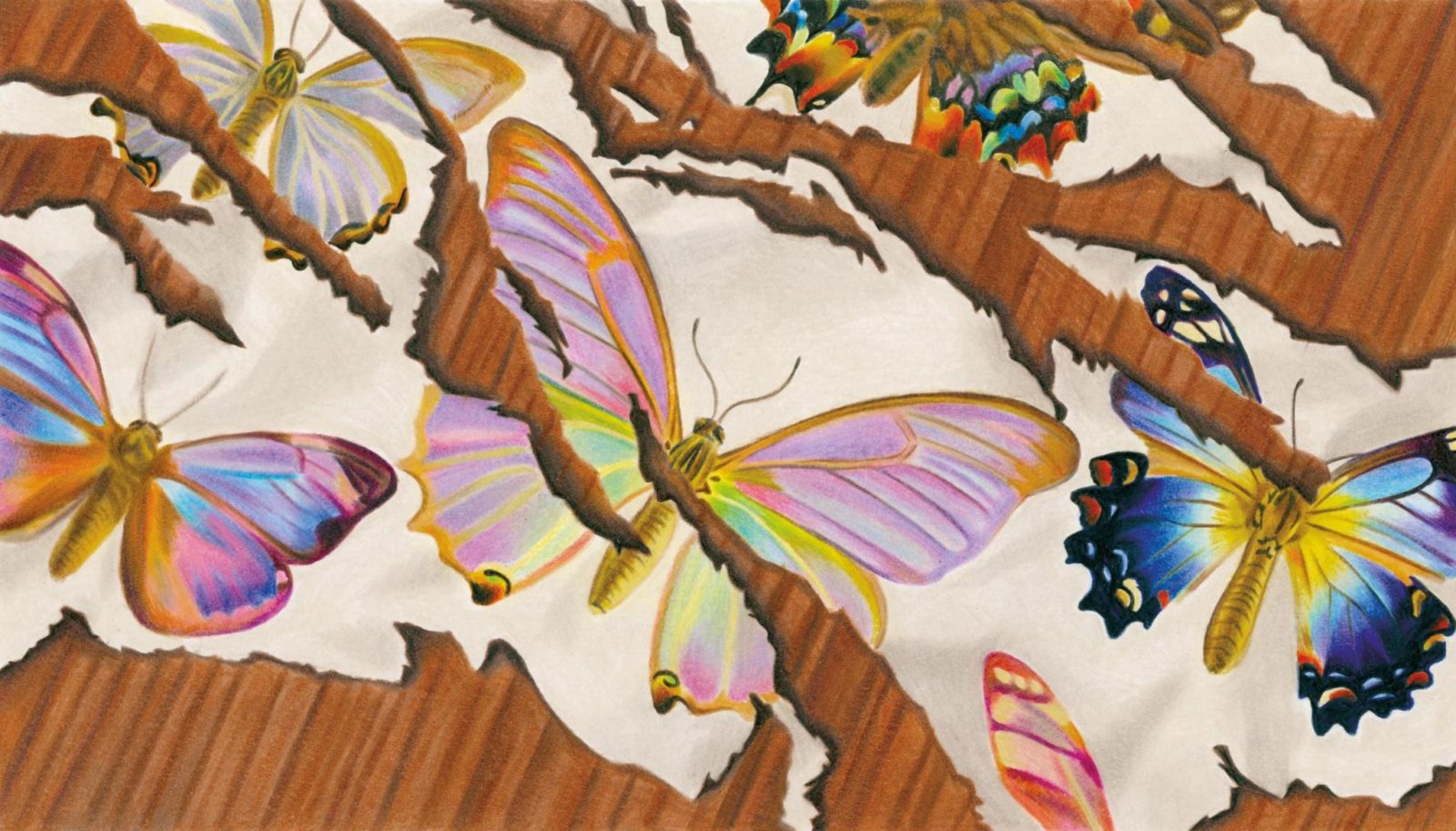
Credit @ Laura Ottone
As the 2022-2023 academic year is dedicated to respect and fight “against all forms of harassment and gender violence” (11), a few weeks after the 7 October court ruling, biology students were sent a Google form. It was badly written and ill-intentioned: “What do you think of the repercussions of Nieberding’s case with her work at UCLouvain (professor, promoter)?”. The questionnaire was created by students, but according to extracts from written conversations that we could read, it was created at the request of Pascal Lambrechts, Dean of the Faculty of Science. Numerous voices took offense to this survey and emphasized Caroline Nieberding’s qualities. The Tulkens Committee, which at the time was evaluating the measures in place to combat harassment and gender-based violence at UCLouvain – we will come back to this later -, writes to the rectorate and to the University Board of Administration to denounce this “serious misconduct”, which could be interpreted “as a measure of reprisal or retaliation […], which is formally and expressly prohibited by the Belgian Code of Wellbeing at Work”.
Then, in March 2023, the atmosphere within ELI became even more charged. Two climate-controlled machines used for rearing insects, paid for with public money (12) and used by Caroline Nieberding’s laboratory, were damaged. The biologist called for an internal investigation, which was carried out, but no complaint was lodged. The damage to the equipment remains unexplained. It prevented any research from being carried out in the field. In April 2023, all hell broke loose: UCLouvain obtained a reversal of the judgment against it at first instance. The judge ruled that “the analysis of the case file […] does not lead to the conclusion or presumption that Professor Nieberding was the victim of moral harassment or violence in the workplace by UCLouvain”. The institution saves its reputation by crushing a professor. On sick leave, she has not returned to work for a year and a half. “If Caroline Nieberding doesn’t come back to work soon, her career is pretty much over”, worries Violaine Alonso, her lawyer. “Not publishing is catastrophic for her. The university is well aware of this. And yet there is no movement within the new rectorate to remedy this, to say: ‘We’re losing a professor, let’s do something about it’.” The lawyer and her client feel that they are trying to identify avenues for negotiation, but the two parties do not agree – and meanwhile, the university is advertising for a position that is eerily similar to that of the biologist.
Waste or premeditated liquidation? According to two eyewitness accounts, the President of the ELI Institute, Marnik Vanclooster, announced in 2021 that Caroline Nieberding’s career at UCLouvain was over. She was already gradually being ejected from the university. Jean-Pascal van Ypersele also sees reprisals being taken against him for his role as whistleblower. He particularly cites the lack of any real support from the rectorate for his application for the presidency of the IPCC in 2023, despite the fact that UCLouvain had benefited from the prestige of the Nobel Peace Prize received by the climate scientists’ group in 2007, when he was a member of its executive board. Recently, he was “forced to move to another institute within UCLouvain to continue his work for the IPCC”.
Jean-Pascal van Ypersele: sidelined from the Louvain-la-Neuve campus, even though his position is funded by the Walloon government. Bertanne Visser: rescued at the last minute by Uliège. Caroline Nieberding: devastated and disgusted.
The Nieberding and Visser ‘files’ are not isolated cases. An ongoing investigation by the Walloon Brabant labor auditor’s office has been dealing with about ten individual complaints.
Since spring 2022, the Walloon Brabant labor auditor’s office has been worried about the way in which UCLouvain handles complaints it receives from staff – both women and men. An investigation based on ten individual complaints (13) should be completed by the end of 2024 or early 2025. If the charges are sufficient, the case will be referred to the magistrates’ court or the criminal court. UCLouvain refuses to comment about this investigation by the labor auditor’s office, for which the rectoral authorities have been auditioned by the police. The university (14) also refuses to position itself about the cases of Bertanne Visser and Caroline Nieberding. “UCLouvain will refrain from any comment on individual cases to respect the people involved”, is the systemic answer we get from the institution, since “some of these cases are currently at court”. Bertanne Visser is awaiting a judgement in first instance for her potentially abusive firing. Caroline Nieberding will be at the cassation court in 2025.
Today, while women are in the majority as students (55%), they disappear at the doctoral level. At the full professor level, UCLouvain has only 18% women. The institution has not yet produced any studies to analyze the correlation between this free fall of women throughout their career and sexist and sexual violence in the university environment, which is finally being acknowledged and expressed. But one thing is certain: “Universities are losing a great deal of potential because of sexism. Training female researchers is very expensive. It’s a scientific, academic waste, and therefore the societal waste is immense”, warns Françoise Tulkens, one of the many witnesses interviewed for this article, Professor Emeritus at UCLouvain and former judge at the European Court of Human Rights.
144 RECOMMENDATIONS AND FEW CERTAINTIES
In 2022, Rector Vincent Blondel commissioned this well-known figure to chair a commission of experts to evaluate the measures in place to combat harassment and gender-based violence at UCLouvain. This ‘Tulkens’ committee made 144 very specific recommendations to the rectorate of UCLouvain to eliminate gender-based violence from this six hundred years old Catholic university. The 144 points follow the logic of the ‘3Ps’ of the Istanbul Convention: prevention, protection, prosecution. In practical terms, this means building an environment conducive to the emergence of whistleblowers, protecting whistleblowers and amend disciplinary regulations to punish those responsible.
But what is UCLouvain doing with this report? In early November 2024, we asked Marthe Nyssens (pro-rector of transition and society, PhD in social economics), Florence Stinglhamber (vice-rector for Personnel Policy, PhD in Psychology) and Sébastien Van Drooghenbroeck (pro-rector of Equality, Diversity and Inclusion, PhD in law). All three indicated that a new disciplinary regulation dedicated to gender-based and sexual violence should be in place by September 2025. This will be two years after the report that suggested it.
The current rectorate has announced an extension of the statute of limitations for internal complaints. Today, the much-criticized rule limits it to six months. “As for the Together platform, which is used to report incidents of harassment or sexual and gender-based violence, it has been reformed (15). We recorded 49 reports, which led to 6 formal complaints, 2 warnings and 1 dismissal”, says Marthe Nyssens.
Last, Florence Stinglhamber assures us that she deals correctly with every complaint that arrives in her mailbox from an employee looking for support. Does she work differently than her predecessor, Didier Lambert? She doesn’t know. In fact, she answers “no” when asked if her work is controlled. Trust, then. A nice word. On the other hand, despite its insistence on ‘the suffering of victims of sexual and gender-based violence’, UCLouvain has nothing to say about the academic careers already damaged by the prevailing sexism. No proposal for reparation.
While awaiting the outcome of her action, Caroline Nieberding says she only wants one thing: to be able to carry out her work “under the same conditions” as her colleagues, “without humiliations”. Will the institution help her to put her ‘little fish’ back in the water, and get her research back on track?
Testimonies and responses
To help us continue investigating power struggles, gender-based and sexual violence (SGBV) and the “micro”-aggressions that hinder academic careers, at UCLouvain and elsewhere: [email protected]
Anonymity guaranteed.
References:
- 1. In 2025, UCLouvain will celebrate its sixth century of existence.
- 2. In 2023, UCLouvain’s own ‘Tulkens’ report defined the university environment as follows: “Singularly marked by sexual segregation, both horizontal (between disciplines, professions, statuses) and vertical (between bodies and functions), rooted in tenacious “customs”, “cultures” and “traditions” of a “patriarchal nature”.
- 3. This incident was also reported by the Apache.be media on 23 October 2023.
- 4. According to an internal e-mail produced by UCLouvain in the complaint filed with the Labour Court of Walloon Brabant (Wavre division).
- 5. In particular from the FNRS.
- 6. Made up of academics, representatives of the scientific community and administrative and technical staff, the ELI Board is involved in the management of the Institute.
- 7. He and his team from the “Walloon Platform for the IPCC” are now attached to the École Polytechnique de Louvain, having been “forced to move out of ELI”.
- 8. According to Professor Bertanne Visser’s FNRS application.
- 9. As Le Morgen also wrote on 16 March 2024.
- 10. In the bargaining, UCLouvain chose to lose one researcher and keep the first machine.
- 11. See the speeches given by Vincent Blondel and Jean Hilgers on 19 September 2022.
- 12. Each one costs around €14,000.
- 13. In addition, the auditor’s office heard other testimonies, some of which related to events that were time-barred, but which illustrate the internal dysfunction at UCLouvain.
- 14. On 23 September 2024, we sent interview requests to Vincent Blondel (former rector), Didier Lambert (former VRPP) and Alexia Antenne (still general administrator of UCLouvain), without any favourable response from them.
- 15. It has been criticised in the past for being ambiguous about the anonymity of victims, but above all of those receiving complaints.
Further Credits: Laura Ottone, visual author
3,000 Nautical Miles of Hope
The sea was calm and smooth off the Brazilian coast on the morning of 10 July when a police patrol boat approached the grain freighter Ken Wave, eight nautical miles from the city of Vitória. The authorities had been alerted after the crew of the Nigerian-registered freighter spotted a group of stowaways.
One of the officers raised his smartphone, zooming in on the massive, rust-coloured hull. There, perched on the rudder blade, were a few tiny figures—crouched, exhausted, as if they had just been spat out by a whale, like Jonah.
“Sir, do you speak English?” shouted the Brazilian. “How many people?”
“Four!” shouted one of the men, who was wearing a tattered denim shirt.
“Do you have food or water?”
The men responded with gestures that vehemently denied this. “Okay, we’re here to help you,” the police officer called out, then he explained that they were now fetching life jackets, water, and some chocolate. This was the last scene of the video sequence that would soon spread across the world—the final stage of a 14-day odyssey had narrowly avoided ending in death.
If the Ken Wave, which was on its way to Santos, hadn’t briefly anchored off Vitória to take on a new crew, any help would likely have come too late for Thankgod Yeye, Roman Friday, Sunday Ugbo, and Destiny Eze.
And so, after spending a night in the soft beds of a hotel, the four Africans sat before a migration officer, trying to put into words what on earth had led them to attempt crossing the Atlantic in the cramped, stifling shaft housing a cargo ship’s steering column.
Their statements were sparse, consisting of brief sentences that boiled down to economic hardship. They spoke of having no work, no home, and no future in their homeland. “Nigeria is hell,” Roman said, explaining that he had pinned all his hopes on Europe. What they hadn’t realized was that the ship was heading southwest, each cursed day carrying them farther from their destination.
But—did that truly explain anything?
According to the International Organisation for Migration, there are more than 280 million displaced people worldwide. They flee wars, conflicts, political persecution, droughts, floods—or simply the grinding poverty of a country like Nigeria, where half the population dreams of a life elsewhere.
Their problem is that they are increasingly being perceived as a threat in the prosperous countries of Europe and North America. To appease their citizens, governments are fortifying borders, making them ever harder to cross. Europe is pouring millions into the coast guards of North African transit countries and seeking third-party states to process asylum applications on African soil. Repatriation agreements aim to expedite deportations of those who are turned away.
The doors are rarely opened anymore.
To address labor shortages, Germany is now actively seeking skilled workers from West Africa. But this is a kind of cherry-picking policy targeting those who already have good career prospects at home. For the vast majority, like Thankgod or Roman, the cost of a visa alone is an impossible to afford, so legal migration is an illusion.
As a result, for an ever-growing number of people, the routes are becoming ever more complex—and far more dangerous. By 1 June, 200 Nigerians had already drowned in the Mediterranean or perished crossing the Sahara. In April, a stowaway froze to death in the landing gear of a KLM plane flying from Lagos to the Netherlands. In September 2022, the crew of a Panamanian-flagged freighter discovered 11 Nigerian stowaways on board and simply threw them into the ocean off the coast of Liberia.
This is what the images of the four exhausted bodies beneath the hull of the Ken Wave conveyed— the sheer absurdity of their hiding place, the universal fears it evoked. The message was undeniable: even if you close every door, we will find a way through. Desperation is relentless. It keeps inventing new ways.
“What did I have to lose?” Thankgod says one morning shortly after his arrival—as if his own life didn’t matter.
He is sitting in the dining room of a church-run migrant shelter in São Paulo, eating a plate of rice, still amazed at where he has ended up. He knew that a few Ronaldos or Ronaldinhos played football in Brazil, but he hadn’t realized this was the same 3,000-mile route millions of his ancestors were forced to take, brought here as slaves. When he hears about it, he clicks his tongue.
“I hope they were treated well,” he says softly.
Thankgod is a small, thoughtful man in his late thirties who used to preach as a pastor in an evangelical church in Lagos. To protect himself from winter in the southern hemisphere, he wraps himself in a down jacket. As he eats, out of the corner of his eye he notices that Roman, who is wiping the tables, keeps glancing at him with suspicion.
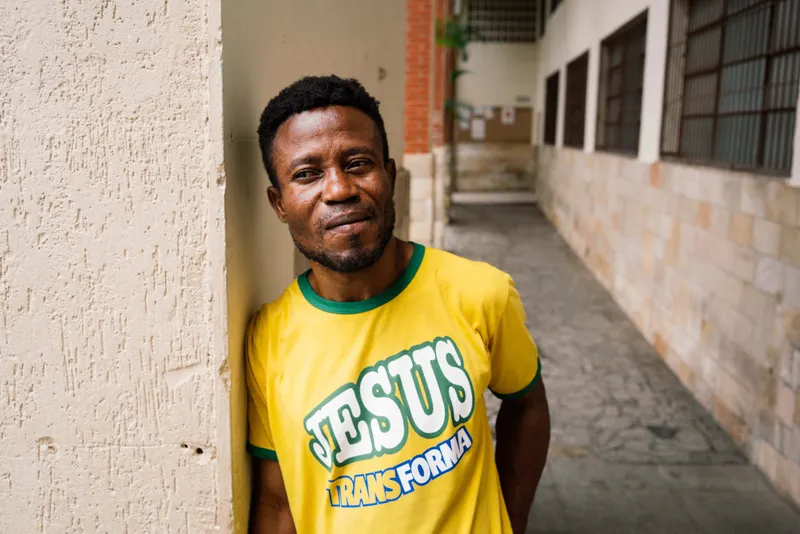
Thankgod Yeye, Photo: Ian Cheibub / DER SPIEGEL
Unlike Sunday and Destiny, who requested to be sent back to Nigeria, Thankgod and Roman were determined to try their luck in Brazil. They now sleep in a five-bed room with a Nepalese man. There are shared showers in the hallway and a room with lockers where Thankgod keeps his shampoo, a bottle of spicy sauce, and a tin of cocoa.
He is allowed to stay for three months. Every morning, he sits in a classroom with Angolans and Afghans, learning Portuguese. Staff members send him job listings or help translate during visits to government offices.
One of the priests now approaches Thankgod’s table and asks if he can stop by later to help him write his résumé.
Thankgod nods with a smile.
Once the man has left the room, Thankgod pulls out his phone and opens the photo gallery. He scrolls to the certificate of a company registration, an export licence issued by the Nigerian Export Promotion Council.
“I’m actually a businessman,” he mutters.
Tomrio World International Ltd.—the name of his company—sounded like a dream. After his geology degree led nowhere, he says, he took out a loan in 2017 and built a farm on a few hectares of red earth on the outskirts of Lagos.
Thankgod dug a fish pond. He put up a shed. He planted peanut crops and invested in machines to shell and roast the nuts and extract the oil from them. With the leftover dough-like mass, he made sweet cakes he planned to export.
“I wanted to travel,” he says—by plane, not illegally on a ship. But then, sometime last year, the rain came.
It rained throughout October.
November too.
By December, the mud had swallowed up the entire farm.
“Do you think these certificates are of any use to me here?” he asks, before swiping through the photos again.
He shows a billboard-sized church poster announcing Pastor Thankgod’s sermons. A picture of Rita, his wife, who had worked at First Bank. Their wedding photos—him in a suit and tie, her in a pure white dress. His children from a previous marriage: Cynthia and Godswill.
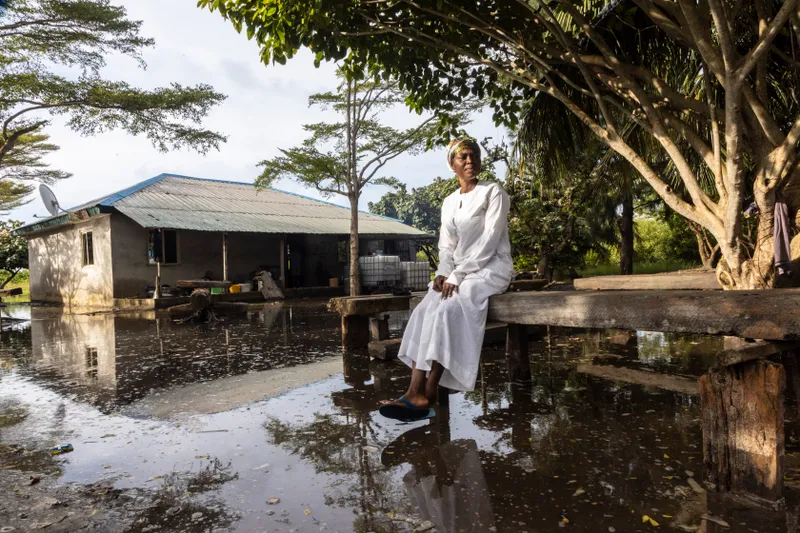
Rita Obiageli Yeye, Thankgods Wife, Photo: Andrew Esiebo / DER SPIEGEL
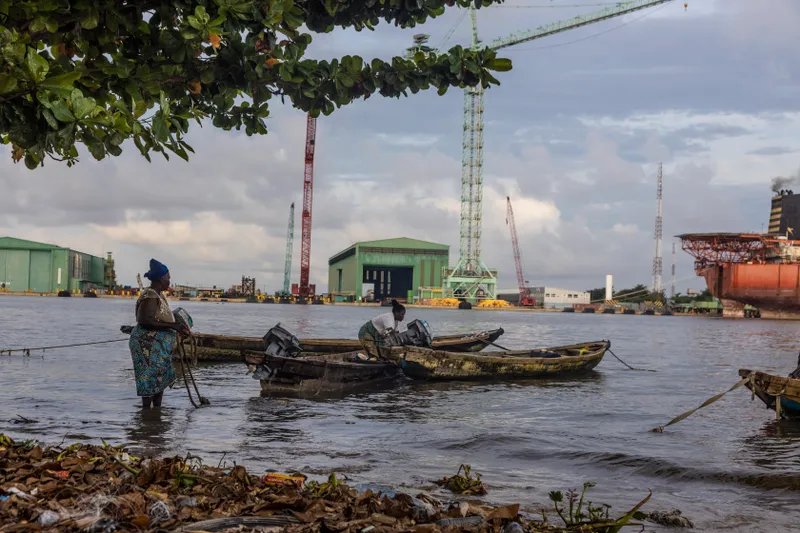
The view from Ogogoro Island onto Lagos harbour, Credit @ Andrew Esiebo / DER SPIEGEL
“We were a middle-class family,” Thankgod whispers, “but Nigeria is a country that won’t help you when you’re in trouble.”
He sees Brazil as more progressive. When he arrived and sat in the immigration office, the man explained to him that citizens in need received social assistance from the state. He was also told that doctor visits were free. These were things that convinced Thankgod to apply for a residence permit. They gave him confidence that he would soon find a job, so that he could bring Rita and the children over.
When he charges his mobile phone on the patio in the morning, his chat fills up with messages from her. Rita is pressuring him, he says. She has to hide from the creditors who are demanding repayment of the loan. When will he finally send something? So far, the only money he has managed to send is $250, donated by a newspaper reader.
This morning, he skipped language class to pick up another donation at Western Union, but the money didn’t go through. Maybe the donor misspelled his name, he tells himself. He tells Roman, who was entitled to half of this transfer, the same thing.
Roman doesn’t trust him. He thinks Thankgod pocketed the money, and is now circling him like a predator.
“Brazil,” Sunday mutters, lying on a mattress in his damp room on the other side of the Atlantic on an October morning. “I hope they’ll be happy there.”
Pale light falls on his face.
You can hear the waves crashing.
Sunday was the mastermind behind the trip. For him, only one thing counts: Europe. That’s why he’s here again, surrounded by bags of clothes, pots, and the plastic buckets where he collects rainwater to shower. As if fate, or a cruel joke of international shipping, had sent him back to square one.
The place where Sunday is now stranded is called Ogogoro, a small island in the Lagos harbor. Five hundred people live here, in modest houses or crooked shacks patched with corrugated iron. Outside, a few chickens peck at the sand. On the beach, right in front of Sunday’s door, lie the wooden boats his neighbours use to fish for their meals in the oil-polluted bay. Further along, barely 150 metres away, giant cargo ships dock at the piers—like an eternal promise against the skyline.
Sometime late last year, Sunday says, Thankgod first appeared on the island. He sometimes saw him creeping through the bushes, stashing returnable bottles in a fishing net. Roman, who had lost his job as a pipe welder during the pandemic, lived a few metres down the beach with his grandmother. Destiny, who vanished after returning from Brazil, was one of the guys Sunday used to hang out with in front of the kiosk, hoping the generator had enough diesel to charge their phones.
What connects the four of them is Ogogoro—a rough patch of earth where Nigeria’s problems collide. Around 60% of citizens live in what the National Institute of Statistics calls “multidimensional poverty”—a condition where everything is precarious: the houses, the food, the job market, which has no place for the five million students who graduate from school or university each year.
“Ogogoro is not a place you want to stay in,” says Sunday, who has been living here for three years. He had found a job over at the pier, entering ferry passengers’ names on lists for a few naira. It wasn’t what he had dreamed of. After school, he says, he wrote a novel and had a dozen copies printed at his own expense. Then he studied law for a few semesters before finding a job in a friend’s shop selling imported women’s fashion from China.
His training as a salesman was meant to last five years, but in the fourth year, a fire destroyed the boutique. It was like Thankgod’s story—one unexpected event, and everything collapsed.
“Is that it?” Sunday would ask himself, sitting on a rock at the tip of the island, watching the ships pass him by, headed for distant lands. At some point, he says, he began to study them more closely—their architecture, their logistics. He learned to decipher the coded language of the Marine Traffic app. LOS stands for Lagos. STO for Santos. Green arrows mark cargo ships. Orange for trawlers. Red tankers move under Navy escort to protect against oil pirates.
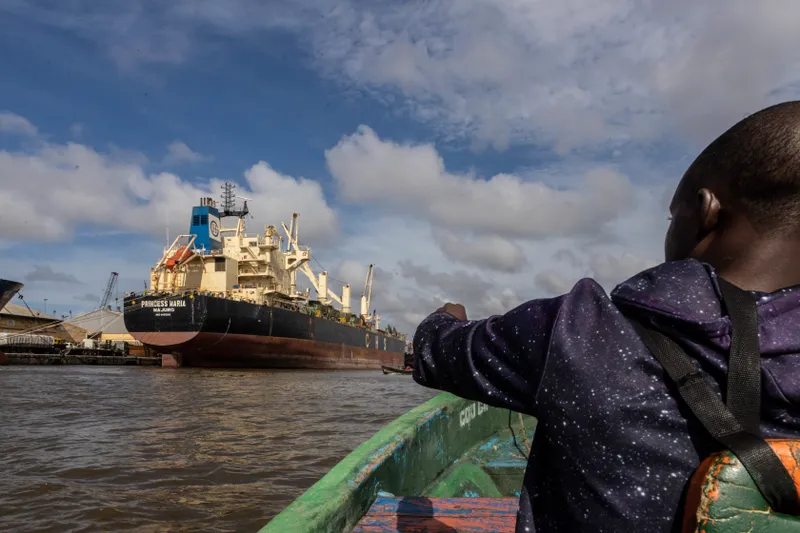
Sunday Ugbo shows, where the container ship Ken Wave was laying in Lagos harbout, Photo: Andrew Esiebo / DER SPIEGEL
“On average, they stay here for 13 days,” Sunday shouts over the wind as he steers a fishing boat toward the docks, where huge cranes unload containers from Chinese freighters. Grain carriers disappear in the dust. In front of a terminal where the food company Dangote operates a sugar refinery, he points to a ship that has just arrived from Russia.
“The Ken Wave was moored here,” he calls out.
Then he points to the mast above the bridge.
“See the radar? When it starts rotating, the engines fire up. That means the checks are over. From that moment, you have an hour to get on board.”
Sunday put his specialised knowledge to the test for the first time in 2020, but the cargo ship he hid on remained in the port of Lomé, the Togolese capital, for several days. When he ran out of food, he hammered on the hatch that connects the shaft to the engine room until someone heard him and let him out.
The following year, he tried again—and made it back to Lomé. Then came trips to Cameroon, Kenya and Angola–blind journeys, because the destinations only pop up in the Marine Traffic app once you set sail. The only time he didn’t ask to be sent back was in Algeciras, Spain—but the Spanish authorities deported him anyway, without explanation.
“Study trips,” Sunday jokes. His WhatsApp profile picture isn’t a photo but a sketch of a seedling. Next to it, a verse: The day you plant your seed is not the day you reap. Be patient and have hope.
Think big.
When Sunday sat on his meditation rock this spring, Thankgod sometimes joined him. They had started talking when Sunday went next door to buy soap and spices from Thankgod’s sister. Thankgod told him about his farm, the rain, and the debts. One day, as they watched the ships leave, he blurted out:
“Sunday,” he pleaded. “Please get me out of here!”
Sunday: When I saw that the cranes were retracing from the ship, I signalled to the others. We sat together on the beach and waited for the radar. When it started spinning, a fisherman ferried us across, paddling as silently as possible.
Roman: Then we climbed onto the rudder blade, slipped through the opening, and climbed up a ladder into the shaft. Sunday, who had been with me in Togo, had asked me to get two fishing nets. We stretched them between the walls, one on the right of the steering column, the other on the left.
Thankgod: We lay in them like hammocks. Sunday I shared a net with Destiny; I got stuck with Roman, who I had seen before in Ogogoro. It was pitch black. The water was bubbling three or four metres below us. The engines were making a hell of a noise, but we didn’t say a word.
Sunday: I opened Marine Traffic one last time. Just before we set sail, the destination flashed on the screen: Santos! Even though I knew at that moment that I would soon be back, I still felt it—a sense of freedom.
On 27 June at 7:05 p.m., the Ken Wave set sail. This 190-metre-long, 32-metre-wide ocean giant had arrived from Brazil two weeks earlier with a cargo of sugar. The return journey was an empty trip, meaning the ship was so light that the opening of the rudder shaft sat above the water surface.
Nigeria exports little apart from oil. Most cargo ships leave the country empty and depart without a load. What they do carry are stowaways.
According to a report by the International Maritime Organization, 250 young men boarded ships in Nigeria in 2017 alone. Ship insurers call Lagos a “high-risk port.”
Roman: We told ourselves that we were brothers now, that we shared everything. We had peanuts with us, biscuits, and 40 bags of water, which would last us for a fortnight. We always ate at midday, when the sun was at its peak.
Sunday: At first, I checked my Bible app once a day.
Thankgod: I prayed: Please, Lord, spare us from a storm. It’s scary enough as it is. The ship is huge, and it sways. One wrong move and you plunge down. I tried not to sleep, but I nodded off once, and when I woke up, my headwarmer was gone.
Roman: You try to lie still to protect the nets. If they tear, it’s over. Once I cut off a piece of my sleeve to replace one of the ropes we used to secure the nets to the wall.
Sunday: When we stepped on the ladders to tighten the ropes, I saw Destiny shaking. To distract him, I asked: “I wonder how Chelsea played?”
After a night in which Roman repeatedly woke Thankgod up and called him a fraud, accusing him of stealing the Western Union donation, the tension finally boils over. In the patio of their accommodation in São Paulo, his “brother” punches him in the face.
“Roman is a street kid,” Thankgod grumbles later, sitting on the pavement in front of a bakery. “I would never do something like that.”
That afternoon, he asks the fathers for separate rooms. These days, when you call him, he is often lying on the bed, head on the pillow, staring blankly into the camera. Then he writes that Rita, his wife, has been arrested. When you ask what’s going on, he answers with just one word: debt.
How much?
$8,000. Maybe more.
His blood pressure spikes so high that someone has to take him to the emergency room. Although Thankgod’s body is in Brazil, his mind is in Nigeria.
In December, after the rains, when he went to check in on his field for the first time, Thankgod simply collapsed. He lay in the mud for minutes. He took the children out of school because he could no longer afford the fees, cancelled his lease, and moved in with his sister in Ogogoro. He buried himself in the Bible under the tree in front of her house, where he read that a man who could not feed his family was not strong enough in his faith. He measured the words against his own life and saw himself not as a provider, but as someone being provided for. A failure who scavenged bottles in the bushes.
Thankgod felt ashamed.
“I was hungry and told myself it was a fasting exercise,” he says.
He searched for a way out.
In February, as Nigeria elected a new president, he put up an ad on Facebook for Peter Obi, a politician who promised more jobs and less corruption. In March, when it became clear that nothing would change, he got hold of rat poison—though there were no rats. He dismissed the idea of heading into the desert, not just because of the terrorists who hunt refugees in the Sahel for ransom, but because the transport, smugglers, and shelters cost thousands of dollars—a fortune that families often scrape together their life savings for.
A boat trip, Sunday said, costs barely ten dollars. Thankgod wrestled with himself.
As a pastor, he says, he is expected to set an example for others.
Sunday: After a few days, Destiny’s condition got worse. He had headaches, fever and started to vomit. We decided he had to eat to get his strength back.
Thankgod: I wondered what would happen if our supplies ran out. Last year, when six men from Ogogoro set out for Brazil, three returned and the others disappeared into the sea. No one knows exactly what happened in the shaft, but there were rumours of an argument, and the thought of it drove me crazy. I was afraid to sleep, afraid that I would be pushed out of the net so the food would last longer. The truth is: you are lying next to strangers, and you don’t know what’s going on in their heads.
Deep below them, at the bottom of the ocean, lay a mass grave. Five million Africans, many from present-day Nigeria, were shipped by the Portuguese to the New World from the sixteenth century onwards. Before they were chained, packed tightly in the belly of the caravels, they were baptised and branded. The mark signified that they now had an owner.
When hunger or thirst overcame them, many resorted to their own excrement.
Historians estimate that 400,000 did not survive the crossing. Those who did were funneled through the slave markets of Brazilian ports into the hinterlands, where they worked on Portuguese plantations. They planted cotton, picked coffee, or cut sugarcane—products that were transported to Europe, converted into money, and reinvested in Africa to buy more slaves.
It was this transatlantic triangular trade that first bound the continents together. It remains one of the foundations of the unequal distribution of wealth in the world today.
All that followed in Nigeria—British colonial rule, arbitrarily drawn borders that forced together hundreds of tribes and cultures into a single nation, an independence that descended into civil war, dictatorship, and a fragile state structure that differs from others in the region essentially only in that its elites are a little wealthier because of oil—all of this has never really been addressed.
In a city of millions like Lagos, not a single museum grapples with the slave trade. Only last year was history reintroduced into primary and secondary schools, after the government had removed it from the curriculum in the 1970s. At the time, Nigeria chose to look ahead. More important than forging a national identity through historical reckoning—by coming to terms with the past—was the pursuit of individual success.
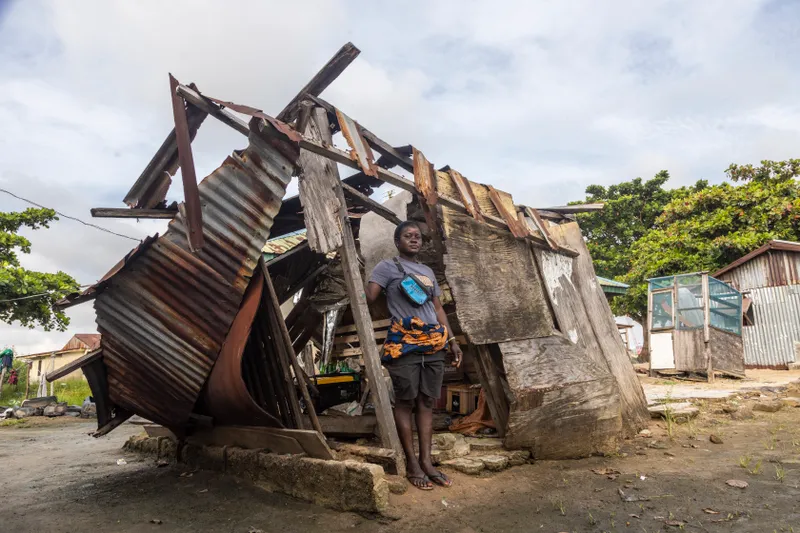
Roman’s sister Julia, Photo: Andrew Esiebo / DER SPIEGEL
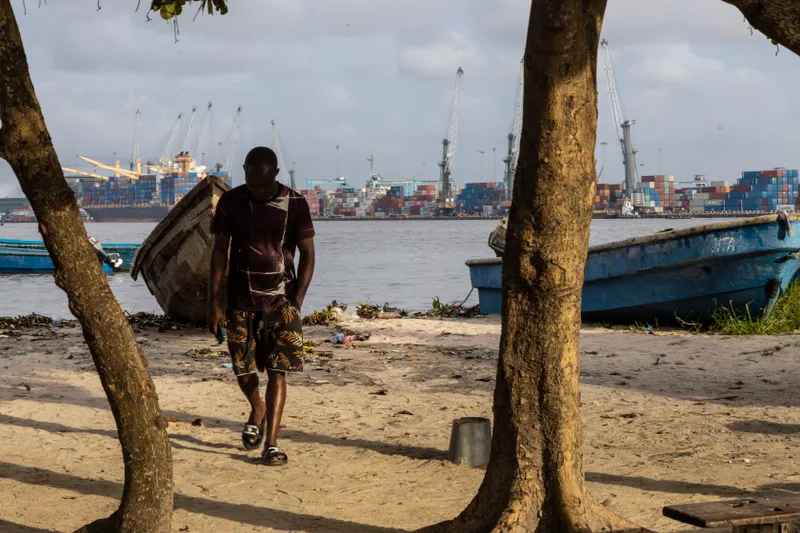
The view from Ogogoro Island towards the skyline of Lagos, Photo: Andrew Esiebo / DER SPIEGEL
Men like Thankgod and Sunday learn what that means from childhood. In the settlements where they grew up, the largest houses always belonged to people who didn’t live there. They heard that their owners financed their neighbors’ lives from afar. And they saw the uproar when the heroes of the diaspora came home, draped in jewelry, their suitcases stuffed with designer clothes, medicine, and toys for the children.
That only a small fraction of emigrants succeed doesn’t matter. What counts are the victory poses with which those who scrape by to afford their Western Union transfers keep spinning the legend on social media. Their success fuels the shame that someone like Thankgod feels. It raises expectations. It increases the willingness to take risks.
Today, slave hunters are no longer needed to drag people onto ships. They come on their own. Bound by invisible chains.
Thankgod: When we opened the last pack of biscuits on the tenth day, I told myself: So now the fasting begins again.
Sunday: I considered getting the hammer out of my backpack, but I hesitated. There was no harbour—it was the open sea, lawless territory. Off the coast of Liberia, a couple of men had recently been thrown overboard after hunger made them reach for the hammer.
Roman: We knocked, knocked, knocked. No one opened. The hatch was closed, welded shut, probably because of fear that pirates might board the ship. I climbed down on the rudder and looked out, but all I saw was grey. Water. Whales. Sky. I know you’re not supposed to drink salt water, but it was all I could find, except for my piss, which I once lapped up from a plastic bag.
Thankgod: When Destiny sucked the last bit out of my toothpaste tube, he vomited again.
Roman: When we boarded the ship, I was more determined than ever. Now I tasted blood bubbles in my mouth and prayed every night that the sun would rise again.
Sunday: When someone dozed off, I slapped them awake.
Thankgod: Lord, I said silently, if you get me to my destination safely, I’ll never do anything like this again.
Sunday: Thankgod was the most afraid. Once he cried when he thought of Rita. Gentleman, I said, relax! One day you’ll catch up with her.
When Rita Obiageli Yeye was released from custody in October after posting a small bail, she moved back into the house of Thankgod’s sister in Ogogoro. Days later, she is sitting on the bench under the tree where he used to read the Bible. With her colorful Sunday suit, her painted nails, and her polished English, she seems like a stranger on the island.
On her lap is a bag with Thankgod’s things: his comb, a few clothes, and the notebook where, in scrawling handwriting, he recorded the lot sizes and future yields of the farm. As she flips through the pages, tears well up in her eyes. Then she breaks down.
“What else could we have done?” she says. “Nobody lends money to people like us in Nigeria.”
When she first met Thankgod, Rita was an account manager at a branch of First Bank. People would come to the counter, hand her their money, and she would count it, recording the balance in their accounts. The temptation was always there. Every now and then, from the deposits of a wealthy man, she would slip a small bundle into her skirt.
They called it “credit” because they always planned to repay the money—once their farm was profitable.
But then, the theft was discovered. A customer filed a complaint. A legal settlement was reached, and now Rita is pinning her hopes on Thankgod finding a job in São Paulo to start paying off the debt. It’s not easy, he tells her over the phone. Jobs are scarce, and the ones he’s been offered don’t pay that well.
“Be patient,” he says. “I’m not lazy.”
Rita swallows.
“I never thought he would find the courage,” she says.
A few days after she found the rat poison in his possession, Thankgod told her he was thinking of leaving. When she asked him what he meant, he put his finger to his lips. “Trust me,” he said, “I’m doing it for us.” And then, just like that, he was gone. Unreachable. As if swallowed by the earth. Rita nearly lost her mind, convinced he had attempted to cross the desert.
Fourteen days later, she saw the images of the rescue on Al Jazeera.
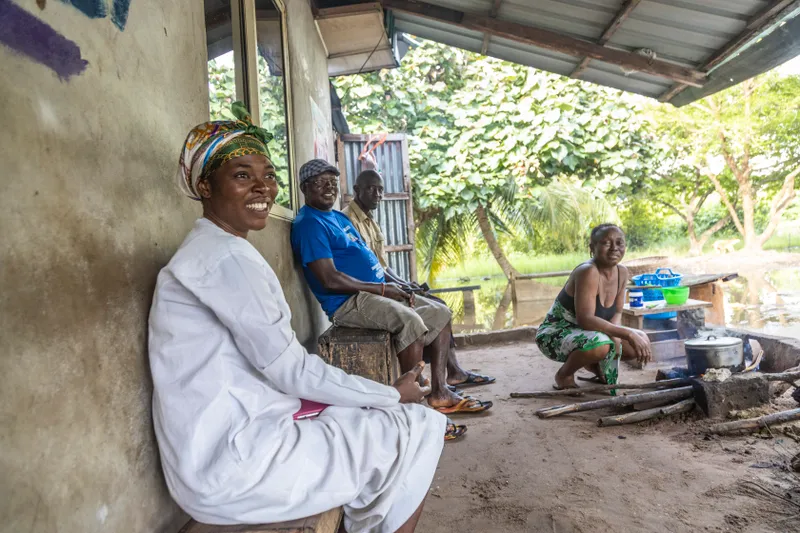
Thankgod’s wife Rita in front of his sister’s house, Photo: Andrew Esiebo / DER SPIEGEL
Sunday, Rita’s neighbour, is sitting under a tree nearby during the conversation. He follows her words with an unreadable expression. Rita has never dared to ask him questions, but now she looks at him expectantly.
“Tell me,” she says, “why are you really back here?”
Sunday avoids her gaze.
He mutters something about Brazil not being for him, but everyone in Ogogoro knows that’s only part of the truth. The freighters, the others say, are a “business” for him—a “big game” in which he wins something every time.
On his “study trips,” Sunday learned that every ship has an agent who, among other things, handles the repatriation of stowaways. These agents are susceptible to blackmail because the companies don’t want any trouble. In Togo, he later said, they paid $100. In Kenya and Angola, $150. The Brazilian agent of the Ken Wave offered him $2,500 just to avoid extra costs for the shipping company, which had to pay for the repatriation.
Sunday grinned.
It was the best-paying job of his life. In 14 days, he made as much as he had in three years at the port desk.
With the money, he paid next year’s rent, invested in his sister’s hairdressing salon. He had also struck a deal with Thankgod. He won’t say how much he charges for his smuggler service, but he knows one thing—you don’t harvest the fruit on the day you plant the seed.
While the boys in Ogogoro pressure Sunday to get them on a ship, Thankgod has become the first in his family to hold the identity document of a foreign country. Now, he is searching for a place to stay in São Paulo. The priests told him it was time to stand on his own two feet.
On a sunny October morning, he is sitting on the patio. He says he didn’t have to think about it for long—his problem is bigger than $2,500. Rita is breathing down his neck about the debt. Sunday is demanding the $100 they agreed on. His sister reminds him daily that his nephew’s birthday is coming up.
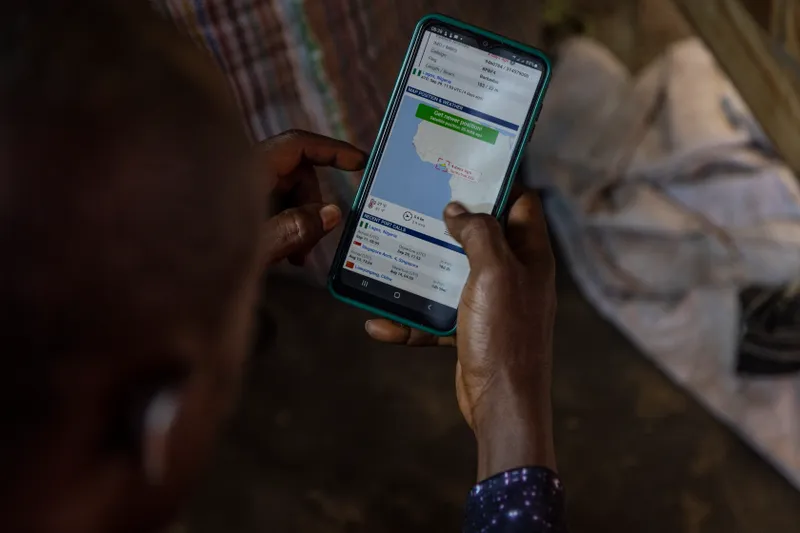
Sunday studying one of the ship apps that he has used to acquire specialised knowledge, Photo: Andrew Esiebo / DER SPIEGEL
It’s a flood of messages.
Everyone wants something from him.
At night, he sometimes pushes a wheelbarrow through the market. During the day, he washes dishes in a restaurant.
“I need something real now,” he says, scrolling through job listings.
A plantation that grows pine trees and sells bark extract to perfume manufacturers is hiring unskilled workers. They offer minimum wage plus food, accommodation, and transport. It doesn’t sound so different from 135 years ago when Brazil became the last country in the Americas to abolish slavery. The only difference is that now, there’s free WiFi.
Thankgod hesitates.
“Three hundred dollars isn’t much,” he says. But it’s what Brazil has to offer someone like him. The country is more open than Europe, but the modern low-wage slaves are still left with almost nothing.
Thankgod, Roman, Sunday, and Destiny were brothers for 14 days after the Ken Wave departed from Lagos—a community bound by fate. Today, they are each going their own way. Roman now spends more time with a Ghanaian who arrived recently on a container ship. Sunday will probably try again soon, once his money runs out. Destiny is still nowhere to be found.
As for Thankgod, he has done the math—it will take years before he can afford a plane ticket for Rita.
He runs his fingers over the comb she had slipped into one of his books back in Ogogoro, asking him to bring it with him.
Sometimes, he says, he thinks about breaking up with her.
To finally move forward.
Further Credits:
- Julia Prosinger, editor at Der Spiegel
- Ian Cheibub, who took the pictures in Brazil
- Andrew Esiebo, who took the pictures in Nigeria
- Dan Ikpoyi, who worked as a fixer in Lagos

